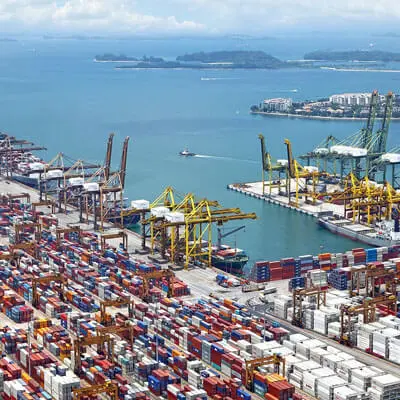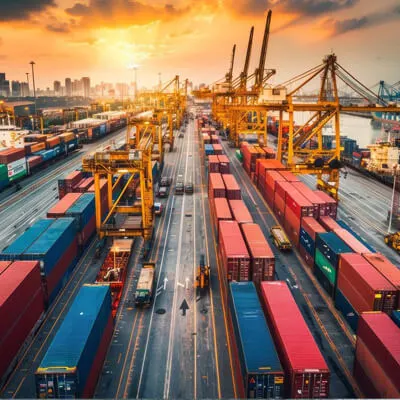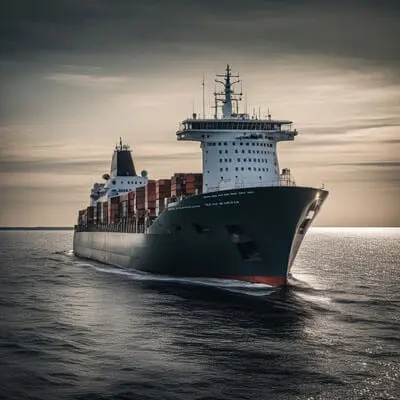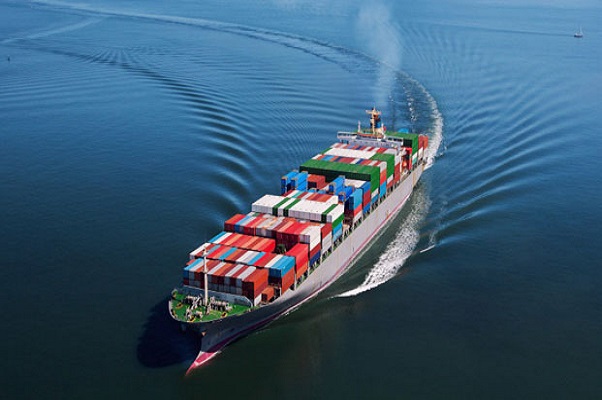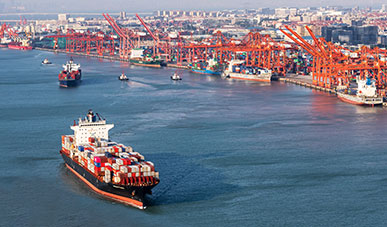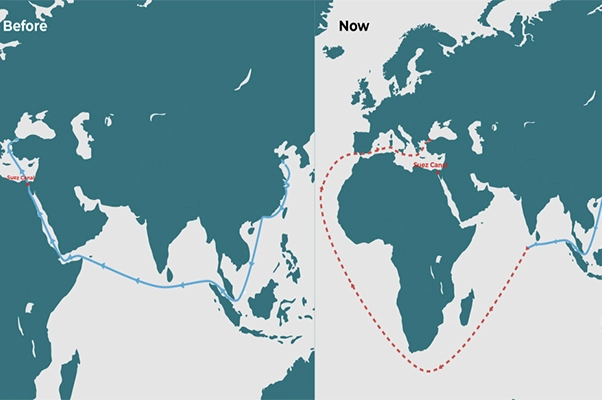+
Free on Board (FOB) is an Incoterm that dictates the seller's responsibility for loading purchased cargo onto the shipping vessel and covering all associated costs up to that point. Once the goods are safely aboard the ship, the risk and responsibility transfer to the buyer, who oversees the rest of the transport process.
FOB is widely used for international sea freight transactions and is specifically applicable to sea and inland waterway shipping.
When an agreement uses FOB terms, the seller is responsible for:
Export Packaging: Ensuring the goods are securely packed for international shipment.
Loading Charges: Covering expenses during the loading process at the warehouse.
Delivery to Port: Managing transportation fees from the warehouse to the port of loading.
Export Duties, Taxes, and Customs Clearance: Completing all formalities for exporting goods.
Origin Terminal Handling Charges (OTHC): Paying charges for handling goods at the origin terminal.
Loading on the Vessel: Handling costs to load the cargo onto the ship.
Once the goods are aboard, the buyer takes on the following responsibilities:
Freight Charges: Paying for transportation from the port of loading to the final destination.
Insurance: Deciding whether to purchase freight insurance for the shipment.
Destination Terminal Handling Charges (DTHC): Covering costs at the destination port.
Final Delivery: Managing transportation from the destination port to the final delivery point.
Unloading Costs: Handling any unloading expenses at the warehouse.
Import Duties and Customs Clearance: Paying taxes and fees for customs clearance, including any penalties or delays.
FOB terms are popular because they give buyers greater control over shipping logistics and costs:
Flexibility: Buyers can choose their preferred freight forwarder to handle the entire shipping process.
Cost-Effectiveness: Buyers can compare shipping rates to secure the best deals.
Streamlined Communication: Using a single forwarder minimizes miscommunication and simplifies logistics.
Control Over Transport: Buyers gain full control over the shipment once it leaves the seller’s warehouse.
For sellers, FOB offers the benefit of completing their responsibility once the goods leave their factory.
While FOB has minimal drawbacks, new importers may find the process complex since they are responsible for organizing freight. However, these challenges are quickly outweighed by the cost savings and control it offers.
To ease the process, new buyers are advised to work with a third-party logistics company experienced in FOB shipments. Such companies can guide importers through the process and ensure smooth operations.
FOB is ideal for bulk shipments by sea. However, it's important to note that FOB terms are not applicable to other modes of transport like air freight. For non-sea shipments, buyers and sellers should consider using FCA (Free Carrier) terms instead.
Buyers are encouraged to use FOB agreements, especially when working with Chinese suppliers, as this method offers transparency in rates and responsibilities. FOB allows sellers to handle part of the logistics while the goods remain in their country. Buyers can calculate total costs by adding the seller’s FOB price to a quote from their freight forwarder.
FOB is a preferred option in China due to its transparency and flexibility. Below are estimated rates and timelines for shipping standard containers from major Chinese ports:
From Shanghai Port
| Destination | 20’ Container | 40’ Container | 40’ HQ Container | Transit Time |
| Long Beach, USA | $2,300 – $3,000 | $3,000 – $3,500 | $3,000 – $3,500 | 14–27 days |
| New York, USA | $2,800 – $3,200 | $3,500 – $4,000 | $3,500 – $4,000 | 25–30 days |
| Hamburg, Germany | $800 – $1,500 | $1,500 – $2,000 | $1,600 – $2,100 | 30–47 days |
| Sydney, Australia | $1,200 – $1,700 | $2,200 – $2,700 | $2,200 – $2,700 | 16–32 days |
From Yantian (Shenzhen) Port
| Destination | 20’ Container | 40’ Container | 40’ HQ Container | Transit Time |
| Long Beach, USA | $2,300 – $3,000 | $3,000 – $3,500 | $3,000 – $3,500 | 15–29 days |
| New York, USA | $2,800 – $3,200 | $3,500 – $4,000 | $3,500 – $4,000 | 27–33 days |
| Antwerp, Belgium | $1,000 – $1,500 | $1,700 – $2,300 | $1,700 – $2,300 | 29–43 days |
| Brisbane, Australia | $1,200 – $1,700 | $2,400 – $2,900 | $2,500 – $3,000 | 11–29 days |
Rates are approximate and subject to change. Buyers can request custom shipping quotes for accurate pricing.
1. Requesting a Product Quote
Most Chinese suppliers provide quotes based on FOB terms. The unit price typically includes product costs and all related FOB expenses.
2. Requesting a Shipping Quote
Freight forwarders require essential details, such as:
Supplier’s address and final destination
Cargo type, dimensions, and weight
Pickup and delivery preferences
Once this information is provided, buyers can receive shipping rates quickly.
3. Confirming the Shipment
After approving the shipping quote, buyers must sign an agreement with the forwarder, who will reserve a spot on the ship for the cargo.
4. Shipping Day
The seller coordinates trucking to the port. Full Container Load (FCL) shipments are loaded at the seller’s warehouse, while Less than Container Load (LCL) shipments are consolidated before departure.
By understanding these processes, buyers can manage FOB shipments from China efficiently and avoid potential delays.
As a premier 3PL service provider, GOWIN offers a comprehensive suite of logistics services under FOB (Free On Board) terms, delivering valuable support to both buyers and sellers in international trade.
For sellers, GOWIN manages transportation to the port of shipment, export clearance, port handling, and the loading of goods onto the vessel. We also handle essential document management and provide optional insurance services for goods up to the point of loading. These services ensure that sellers comply with FOB terms while effectively minimizing logistical risks and delays.
For buyers, GOWIN assists with freight booking, transportation from the port of shipment to the destination port, import clearance, port unloading, as well as warehousing and distribution services. Additionally, we offer logistics consulting to help optimize the supply chain and reduce costs.
By partnering with GOWIN, both buyers and sellers benefit from streamlined operations, allowing sellers to focus on production and sales, while buyers can concentrate on market expansion and enhancing customer service.

